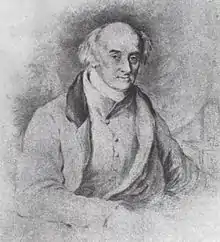Edward Long Fox (psychiatrist)
Edward Long Fox (26 April 1761 – 1835) was an English psychiatrist. He established an insane asylum at Brislington House, near Bristol, England, and classified the patients according to social class as well as behavioural presentation.[1]
Edward Long Fox | |
|---|---|
 Edward Long Fox | |
| Born | 26 April 1761 Falmouth, Cornwall, England |
| Died | 1835 |
| Nationality | British |
| Alma mater | University of Edinburgh |
| Known for | Pioneer of mental health-care |
| Scientific career | |
| Fields | Psychiatry |
He was a member of the Fox family of Falmouth, one of the 11 children of Joseph Fox (1729–1784) and Elizabeth Hingston, his wife. He graduated and MD from the University of Edinburgh in 1784. Following the death of John Till Adams in 1786 he cared for many of Till Adams patients in the local Quaker community.[2] Around the same time he joined Bristol Infirmary as a physician. He worked there for 30 years.[3]
In 1830, he purchased Knightstone Island in Weston-super-Mare to create a therapeutic spa with a range of hot, cold and chemical baths.[1]
Family
Twice married, Fox had 15 daughters and 8 sons.[4]
References
- Smith, L. (2008). "A gentleman's mad-doctor in Georgian England: Edward Long Fox and Brislington House" (PDF). History of Psychiatry. 19 (2): 163–84. doi:10.1177/0957154X07081136. PMID 19127837. S2CID 28304699.
- Hall, Walker (1919). "Contemporary Medicine from the Standpoint of Pathology". The Bristol Medico-Chirurgical Journal. XXXVI (137 December 1919): 105–117.
- "Parks and Gardens UK, Dr Edward Long Fox". Retrieved 14 March 2018.
- Fox, Barclay (2008). Barclay Fox's Journal. Cornwall Editions Limited. p. 27. ISBN 9781904880318.